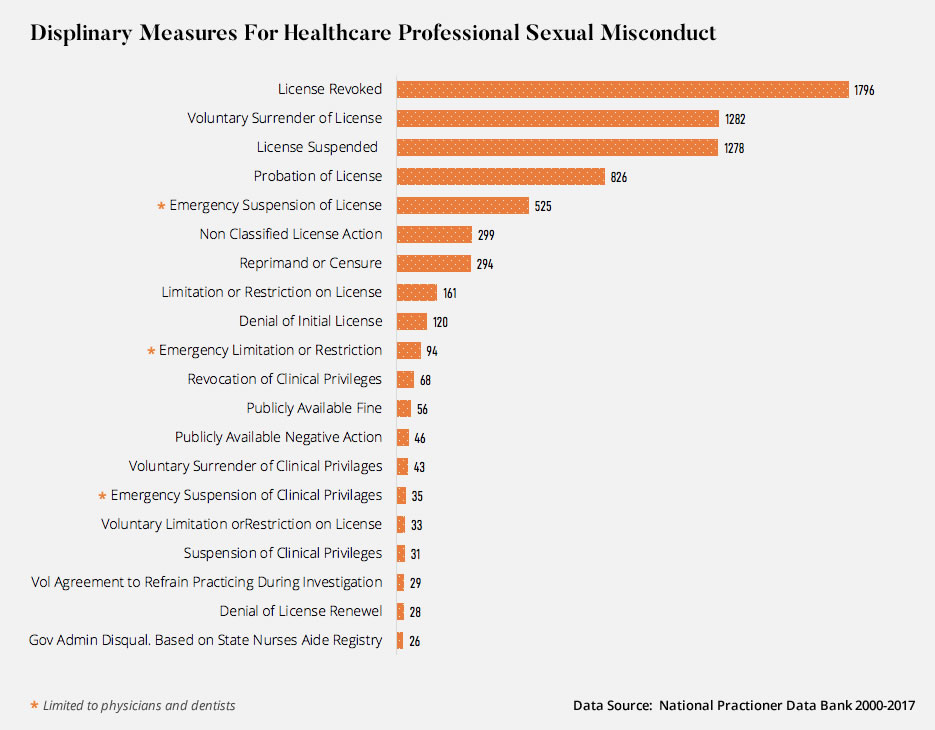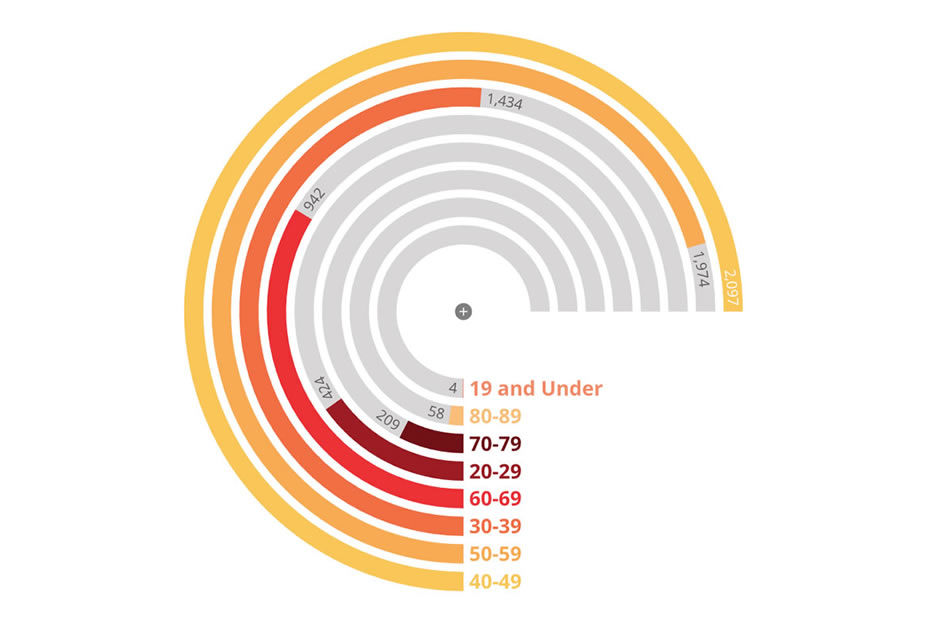[Study] Sexual Misconduct Among Healthcare Professionals

The prevalence of sexual misconduct is a serious issue-one that can affect anyone, anywhere. The healthcare industry is no exception. Cases of sexual misconduct and assault committed by notable doctors and other medical professionals have made national headlines, indicating serious issues at the institutional level.
But how often do health care professionals actually receive disciplinary actions for their alleged gross misconduct?
1Point21 Interactive analyzed the adverse action data from the National Practitioner Data Bank for reports of sexual misconduct and subsequent disciplinary action.
As a result 7,205 separate reports were found of disciplinary measures against healthcare professionals involving sexual misconduct allegations from 2000-2017.
Physicians and Massage Therapists Committed the Most Instances of Sexual Misconduct
When organized by profession and license type, physicians had the most instances of disciplinary action for sexual misconduct, followed by massage therapists and registered nurses.
Adverse Actions for Sexual Misconduct: Top 30 Healthcare License Fields
[wpdatachart id=1]
Massage therapists coming in second is somewhat unexpected, especially in outranking registered nurses. For comparison, registered nurses outnumber certified massage therapists roughly 9 to 1 in the United States.
California and Texas Had the Most Incidents Followed by Washington
By state, California had the most incidents of disciplinary measures, followed by Texas and Washington.
While California and Texas are the two largest states by population, Washington’s presence in the top three is somewhat surprising. Washington’s totals appear to be buoyed by a large number of reports in non-physician professions: the state had relatively high instances sexual misconduct reports among Professional Counselors, Chiropractors, and Nurse Aides.
Revocation of License was the Most Common Disciplinary Action
According to the data, the vast majority of the disciplinary actions revolved around licensing actions. However, only 1,796 instances led to an official revocation of a medical professional’s license to practice. While that is the highest share of any of the adverse actions, it is only 25 percent of the total. The vast majority were temporary punishments – meaning that many had the option to resume their careers after serving their disciplinary actions. Interestingly, license revocation was only the third most common action among physicians – behind probation and suspension.

Age of Healthcare Professionals
Overall, healthcare professionals between the ages of 40-49 received the most disciplinary actions with 2,097, followed closely by ages 50-59 with 1,974, and ages 30-39 with 1,434.

Among physicians, however, older doctors were much more likely to receive disciplinary measures – doctors between the ages of 50 and 59 accounted for 514 of the adverse licensing actions, compared to only 147 against those in their 30s. Notably, there were 332 actions against doctors in the sixties, by far the most of any profession in that age range.
There was a Spike in Sexual Misconduct Reports in 2010
According to the data over time, there was a clear, dramatic spike in reports in 2010. Although some professions such as Certified Nurse Aides similarly spiked sharply in the same year, there was no other indication as to the magnitude of this increase in reports.
Despite Large Amounts of Data, Sexual Misconduct Still Largely Underreported
It is important to note that, due to the nature of the NPDB reporting process and requirements, the true number of affected individuals is likely much higher:
- Organizations are only required to submit adverse action reports to the NPDB if the professional in question is a physician or dentist. The reporting of other medical professionals such as nurses, massage therapists, psychiatrists, etc. is completely optional and up to the discretion of the organization.
- Medical professionals who surrender clinical privileges voluntarily and are not under any official investigation are not reported to the NPDB. In essence, any offending party may be able to negotiate a voluntary disciplinary action in exchange for no official investigation or mark on their public record.
- According to RAINN, 69 percent of rapes go unreported. According to the Bureau of Justice Statistics, 74 percent of sexual assaults go unreported.
Additionally, it is concerning that only 25% of those reported to the NPDB had their license to practice revoked. Sexual misconduct against those who impart their utmost trust on these professionals is a serious issue (and a serious crime in the case of sexual assault) – to give these offenders an opportunity to continue with their professions seems like a gross injustice on the part of the alleged victims.
About the Data
All data was procured from the National Practitioner Data Bank (NPDB). The NPDB is a government-run initiative that gathers data on any disciplinary or adverse action taken against a healthcare professional
All medical facilities are required to report any disciplinary actions (called “adverse clinical privilege actions”) against healthcare professionals to the NPDB. Title IV of Public Law 99-660 indicates that any healthcare organizations must report professional review actions imposed on medical professionals. These are any clinical privilege actions enacted as a result of questions regarding professional competence or conduct.
In this study, we looked at all the submitted actions and focused on those that were enacted due to sexual misconduct. This includes:
- Inappropriate touching and groping
- Flirting and other inappropriate verbal conduct
- Unwanted sexual advances
- Sexual Assault
- Rape
It is important to note that each licensing entity and state board handle professional misconduct (including sexual misconduct) differently. In addition, adverse license actions may be taken based on several different misdeeds. Our data reflects any action where sexual misconduct was listed as all or part of the basis for that action.
